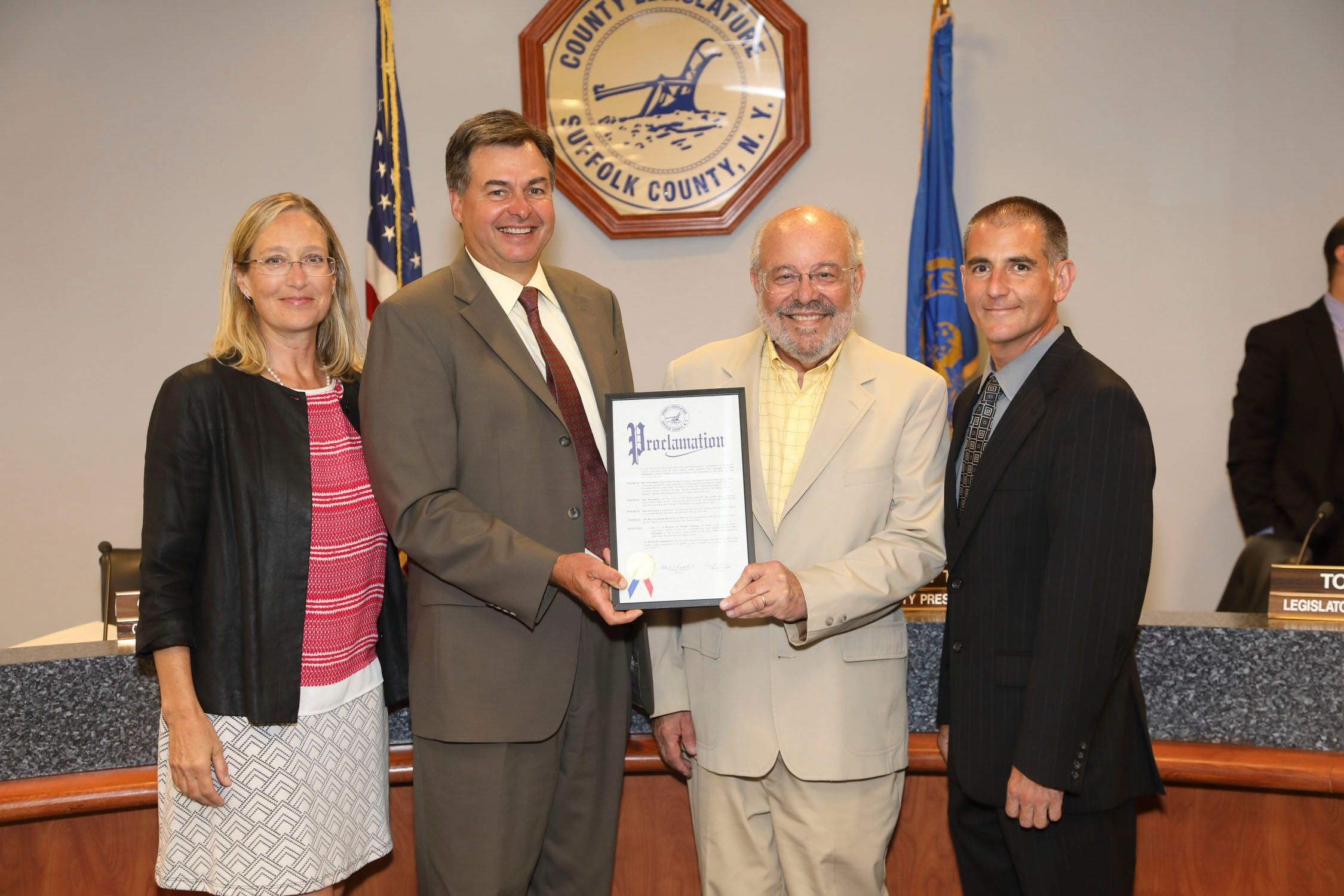
Greater Babylon coverage is funded in part by The Argyle Theatre, where Broadway comes to Babylon. Click here for tickets to ‘A Christmas Carol,’ Nov. 7 – Jan. 5.
 Memories sprung into my head as I walked into the meeting room of the Suffolk County Legislature last week to receive a proclamation from the legislature honoring me for more than 50 years as a Suffolk-based journalist and spotlighting an archive of my work that has been established.
Memories sprung into my head as I walked into the meeting room of the Suffolk County Legislature last week to receive a proclamation from the legislature honoring me for more than 50 years as a Suffolk-based journalist and spotlighting an archive of my work that has been established.
I was in this room regularly in the mid-1960s covering the Suffolk County Board of Supervisors. I looked last week at the horseshoe table in front, where the 10 members of the board sat—the supervisors of the 10 towns of Suffolk. It’s been widened since the days of the board to 18 places for the 18 members of the legislature.
I thought of some of the remarkable members of the Board of Supervisors—Evans K. Griffing, supervisor of Shelter Island, Harry Kangeiser from Islip, Bob Flynn from Huntington, and John V. N. Klein, the Smithtown supervisor and the board’s last chairman.
The board after two centuries was dissolved due to a lawsuit citing the one-person-one-vote court rulings of the 1960s. A panel of 18 districts of equal population, a Suffolk Legislature, was established in 1970 to replace it.
Mr. Klein, so very committed to this county, gave up being Smithtown supervisor to run to be a legislator on the new panel and he became its first presiding officer. He guided it in its early years, forging a continuum between the board and legislature.
Thereafter he became Suffolk County executive with his biggest achievement the first-of-its-kind Suffolk County Farmland Preservation Program which has allowed so much of Suffolk to remain agriculturally productive and green.
On the walls of the meeting room were the portraits the 18 past presiding officers of the legislature. Down the row of photos from Mr. Klein’s was that of John Wehrenberg of Holbrook.
My mind went back to 1971 and the tarmac at the Sydney, Nova Scotia airport. A year before, as an investigative reporter then for the daily Long Island Press, I broke the story about the oil industry seeking to drill in the Atlantic. Strong opposition developed on Long Island to drilling off our shores.
The following year, Shell Canada invited a delegation of Suffolk legislators to visit the first drilling rig set up in the Atlantic, off Nova Scotia. No press was allowed. But the legislators going listed my name as part of the delegation.
“You don’t think you’re going to get on this helicopter, Mr. Grossman,” a Shell Canada executive told me on the tarmac. Mr. Wehrenberg and the other legislators intervened, he telling the Shell Canada executive: “If Karl isn’t going, we’re not going.”
The men from Shell Canada huddled, and soon I was on the chopper out to the rig. The visit was instructive—it was clear on the rig, with its equipment in preparation for a blow-out and spills, that off-shore drilling is a dicey proposition. I recall heading back to Long Island with the legislators, us talking about the impacts on Long Island of oil hitting our beaches.
I looked at the photo of another presiding officer, Lou Howard of Amityville. Now Lou and I were at odds over nuclear power. He was an ardent supporter of the Shoreham nuclear power plant. It was to be the first of 7 to 11 nuclear power plants in Suffolk. Grassroots opposition to Suffolk turning into what nuclear promoters at the time called a “nuclear park” led to election defeats for pro-nuclear officials. But Lou held on and stuck to his pro-nuclear positon.
He was a highly affable fellow, however, and an aviation instructor. And one day we were talking about flying and he invited me to go fly with him.
Over Long Island, he gave me the wheel and after a while the plane began bucking from turbulence. It was scary. But Lou advised, “Just go with it.” And I let the plane be bumped around, and finally the turbulence ended and it was again flying straight and steady.
Lou had things wrong about nuclear power, but his philosophy on how to deal with turbulence was right-on.
I was called up to the rostrum with Dennis Fabiszak, director of the East Hampton Library where the archive has been established.
Legislators Al Krupski of Cutchogue and Bridget Fleming of Noyac presented me with the proclamation which, incidentally, cited “my extensive reporting and writing on the dangers of nuclear power.”
If it weren’t for the Suffolk Legislature under the leadership in the 1980s of Presiding Officer Gregory Blass of Jamesport, we’d have nuclear plants in Suffolk today.
Mr. Fabiszak, explaining what’s been named the Karl Grossman Research Archive, said: “We are digitizing all of Karl’s articles and also all of the primary research which he used to write the articles.
When it is done it will be the largest data base of historic documents in Suffolk County.…Already we have about 7,000 documents online, available and fully searchable. And we’re continuing to add to it every day…We can’t wait to continue the work.”
Please go to the library’s website to access the information. It’s wonderful that my stories and columns, and an array of documents, are available now and into the future.
Photo: Sufolk County legislators Bridget Fleming, Al Krupski with journalist Karl Grossman and Dennis Fabiszak, the director of the East Hampton Library.


























